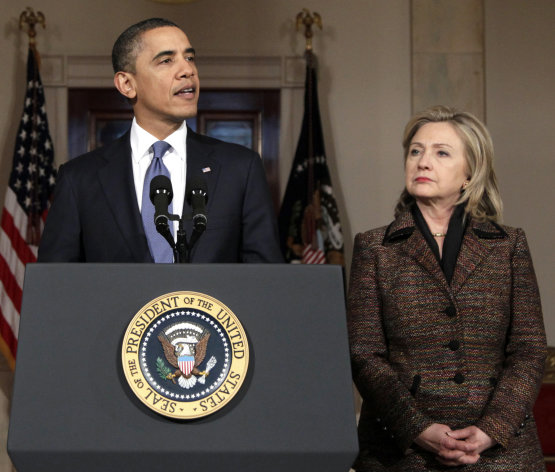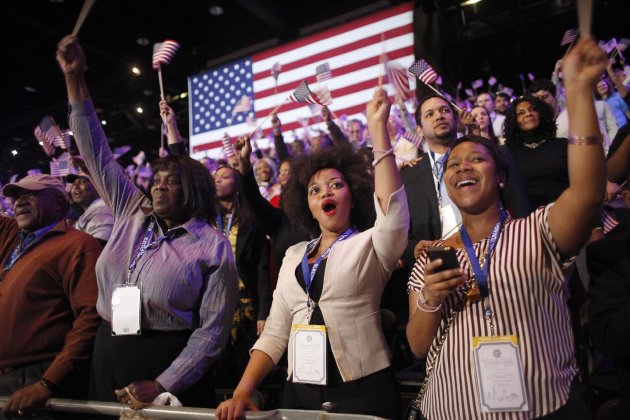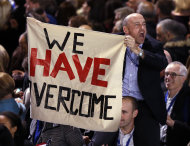
Reuters, Getty Images
Campaigning with Mitt Romney and Barack Obama, voting and election results.
By Michael O'Brien, NBC News
The campaigning is over.
After
months of intense — and often negative — campaigning between President
Barack Obama and his Republican opponent, former Massachusetts Gov. Mitt
Romney, voters headed to polls across the country on Tuesday to render
their verdict in America's presidential election.
The
election would settle the question of which man would lead the United
States for the next four years, but a great deal of uncertainty awaited
the winner of the election. Either Obama or Romney will almost
immediately have to face the so-called “fiscal cliff,” the cocktail of
automatic spending cuts (especially to defense) and tax hikes set to
take effect at the beginning of the year unless Congress acts.
1st Election Day votes cast at midnight -- and it's a tie in Dixville Notch
Those
challenges, the prospect of a “grand bargain” to address mounting
national debt, and a variety of other issues confronted both the
candidates and the tens of millions of voters expected to cast ballots
on Tuesday.
But both campaigns fought hard for months for the right to face those challenges.
President
Obama and Mitt Romney's travel schedules reveal the states that would
help them attain the necessary amount of electoral votes to take the
White House. NBC's Chuck Todd reports.
The dominant
issue of the election was the economy — specifically whether Obama had
done enough in four years to improve upon the profound recession that
had just begun to take hold in the closing weeks of his 2008 campaign.
Romney
argued that his business acumen uniquely qualified him as an
alternative to the president, an assertion which Obama and his
supporters challenged throughout the campaign.
Romney, Obama hit must-win states in 'barnburner' campaign day
The
election played out in recent months amid green shoots of economic
recovery; the U.S. added almost 1.6 million jobs so far during the 2012
calendar year, according to the Bureau of Labor Statistics.
Still,
Republicans, led by Romney, argued that this wasn't enough, pointing
toward the far rosier projections of recovery issued in the early days
of the Obama administration.
The question of whether Obama had
earned a second term, or if Romney was a sufficiently competent
replacement, played out across a handful of battleground states that
will decide the election's outcome.
Your Election Day photos: Show us what you see at the polls
Some
of those states — Iowa, New Hampshire, Florida and Ohio — were familiar
battlegrounds that have swung between Democratic and Republican
candidates in recent presidential elections.
Pollsters
divide the state of Ohio into five regions: coal country, northeastern
Ohio, the auto belt, the Columbus area and the Cincinnati region.
Currently, Obama is doing well in the north and has also made inroads in
coal country – but the real area to watch is the auto belt where Romney
will return to campaign Tuesday. NBC's Chuck Todd reports.
Other
swing states reflected slow changes in political demographics; Obama
has put states like Virginia, North Carolina, Colorado, and Nevada into
play partially due to changes in those states' populations.
Romney,
meanwhile, pressed the GOP cause in Wisconsin, a more reliably
Democratic state in national elections that has emerged as an unlikely
hotbed for a new generation of reform-minded, conservative politicians
(including Romney's running mate, Rep. Paul Ryan).
Both Romney and
the president spent much of the final few days making multiple stops in
those few battleground states, repeating a refined and practiced speech
to crowds numbering in the thousands — sometimes the tens of thousands.
From Afghanistan to Venezuela, Obama vs. Romney battle captivates
Obama's
schedule for the final day took him to Wisconsin, Ohio and Iowa – the
states comprising his Midwestern "firewall," which his campaign hopes
will insulate the incumbent against GOP victories in other battleground
states.
"We've made real progress, Ohio, but the reason why we're
here is because we've got more work to do," the president told a crowd
in Columbus on Monday.
The
President traveled more than 1000 miles Monday, visiting the three
Midwestern battleground states critical to his re-election. NBC's
Kristen Welker reports from Des Moines, Iowa.
"Our fight
goes on because America always does best when everybody gets a fair shot
and everybody does their fair share and everybody plays by the same
rules. That's what we believe. That's why you elected me in 2008. And
that's why I'm running for a second term for president of the United
States."
Romney's last day on the campaign trail featured stops in
arguably the three most critical battleground states: Ohio, Virginia,
and Florida.
He wrapped the day with a rally in New Hampshire, the
state which served as the cornerstone for Romney's bid for the GOP
presidential nomination earlier this year and which neighbors
Massachusetts, where he served as governor and where his campaign is
headquartered.
Telling
crowds in Florida that 'this nation is going to change for the better
tomorrow,' GOP presidential candidate Mitt Romney rallied voters by
saying he would break the gridlock in Washington. NBC's Peter Alexander
reports from Columbus, Ohio.
Romney has leaned upon his
experience as governor – and, before that, as a venture capitalist – to
make the case as to why voters should expel Obama and elect him instead.
“The
president promised change but he just couldn't deliver it,” Romney told
a crowd in northern Virginia on Monday. “I not only promise change, I
have a record of achieving it.”
Full coverage from NBC Politics
Many
voters were set to endure a time-honored tradition – waiting in long
lines – on Election Day, though the portrait of the electorate tomorrow
might not tell the full story of the 2012 election.
Many voters,
encouraged by both the Obama and Romney campaigns, have cast their
ballot prior to Nov. 6. Thirty percent of voters said in this weekend’s
NBC News/Wall Street Journal poll that they had already cast a ballot, a
proportion that could be even higher in battleground states.
Final national NBC/WSJ poll before the election: Obama 48 percent, Romney 47 percent
Polls
often show that Obama leads Romney among early voters, meaning that the
Republican nominee must perform better among voters who actually head
to the polls Tuesday.
The president’s campaign has also sought to
take advantage of changing demographics throughout the campaign, a
strategy that could pay dividends. Obama has courted young voters and
gay and lesbian voters, but especially Latino and women voters.
Analysts are predicting that the new Senate may be even more narrowly divided than it is now. NBC's Kelly O'Donnell reports.
The
president has made a point of assailing Romney’s approach to
contraception and abortion rights and his campaign has sought to link
the Republican nominee to remarks about rape by several Republican
Senate candidates. Obama led Romney, 51 percent to 43 percent, among
women in the final NBC/WSJ poll.
Obama also seized upon Romney’s
hard-charging rhetoric toward illegal immigrants during the primary, and
announced new regulations over the summer ceasing efforts to deport
undocumented citizens who were brought to the U.S. as children.
Six splitting headaches for the next president
The unifying issue among all those voters, however, was most certainly the economy.
Romney
entered Election Day with an advantage over Obama on the raw question
of which candidate voters said was better prepared to create jobs and
boost the economy; 47 percent of voters in the final NBC/WSJ voters said
that candidate was Romney, versus 42 percent who said that for the
president.
Full coverage of NBCNews.com's The World is Watching series
But
Obama also leads Romney by 11 percentage points on the question of
which candidate better looks out for the middle class. Fifty-two percent
of likely voters also said they thought the economy was improving, a
sign that the U.S. has finally begun to climb out from the depths of the
recession.
NBC's Tom Brokaw speaks with young voters grappling with a distrust of the political system.
But
as the hours on campaign 2012 ticked down, Obama seemed on Saturday
night to acknowledge a hard truth: much of his and Romney’s fates were
out of their hands at this point, left to voters who would ultimately
have their say on Tuesday.
“We’re props,” Obama recounted telling a
top adviser during his campaign travels that day. “Because what’s
happened is that now the campaign falls on these 25-year-old kids who
are out there knocking on doors, making phone calls, and then we
realized, you know, pretty soon after they do their jobs then they’re
not relevant either because it’s now up to you.”
 Jaramana is a mainly Druze and Christian district
Jaramana is a mainly Druze and Christian district

























